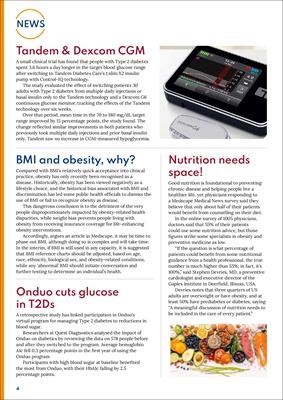
4
NEWS
Nutrition needs
space!
Good nutrition is foundational to preventing
chronic disease and helping people live a
healthier life, yet physicians responding to
a Medscape Medical News survey said they
believe that only about half of their patients
would benefit from counselling on their diet.
In the online survey of 1005 physicians,
doctors said that 55% of their patients
could use some nutrition advice, but those
figures strike some specialists in obesity and
preventive medicine as low.
"If the question is what percentage of
patients could benefit from some nutritional
guidance from a health professional, the true
number is much higher than 55%; in fact, it's
100%," said Stephen Devries, MD, a preventive
cardiologist and executive director of the
Gaples Institute in Deerfield, Illinois, USA.
Devries notes that three quarters of US
adults are overweight or have obesity, and at
least 50% have prediabetes or diabetes, saying
"A meaningful discussion of nutrition needs to
be included in the care of every patient."
Tandem & Dexcom CGM
A small clinical trial has found that people with Type 2 diabetes
spent 3.6 hours a day longer in the target blood glucose range
after switching to Tandem Diabetes Care's t:slim X2 insulin
pump with Control-IQ technology.
The study evaluated the effect of switching patients 30
adults with Type 2 diabetes from multiple daily injections or
basal insulin only to the Tandem technology and a Dexcom G6
continuous glucose monitor, tracking the effects of the Tandem
technology over six weeks.
Over that period, mean time in the 70 to 180 mg/dL target
range improved by 15 percentage points, the study found. The
change reflected similar improvements in both patients who
previously took multiple daily injections and prior basal insulin
only. Tandem saw no increase in CGM-measured hypoglycemia.
BMI and obesity, why?
Compared with BMI's relatively quick acceptance into clinical
practice, obesity has only recently been recognised as a
disease. Historically, obesity has been viewed negatively as a
lifestyle choice, and the historical bias associated with BMI and
discrimination has led some public health officials to dismiss the
use of BMI or fail to recognize obesity as disease.
This dangerous conclusion is to the detriment of the very
people disproportionately impacted by obesity-related health
disparities, while weight bias prevents people living with
obesity from receiving insurance coverage for life-enhancing
obesity interventions.
Accordingly, argues an article in Medscape, it may be time to
phase out BMI, although doing so is complex and will take time.
In the interim, if BMI is still used in any capacity, it is suggested
that BMI reference charts should be adjusted, based on age,
race, ethnicity, biological sex, and obesity-related conditions,
while any 'abnormal' BMI should initiate conversation and
further testing to determine an individual's health.
Onduo cuts glucose
in T2Ds
A retrospective study has linked participation in Onduo's
virtual program for managing Type 2 diabetes to reductions in
blood sugar.
Researchers at Quest Diagnostics analysed the impact of
Onduo on diabetics by reviewing the data on 578 people before
and after they switched to the program. Average hemoglobin
A1c fell 0.3 percentage points in the first year of using the
Onduo program
Participants with high blood sugar at baseline benefited
the most from Onduo, with their HbA1c falling by 2.5
percentage points.